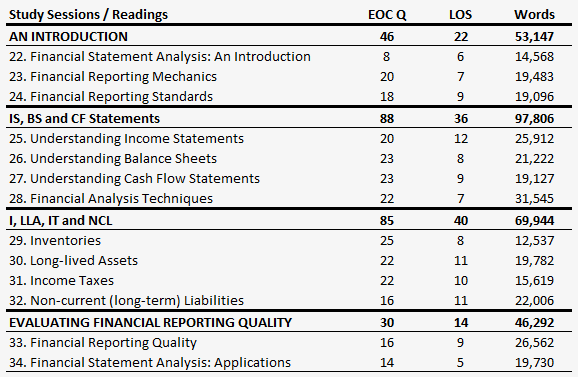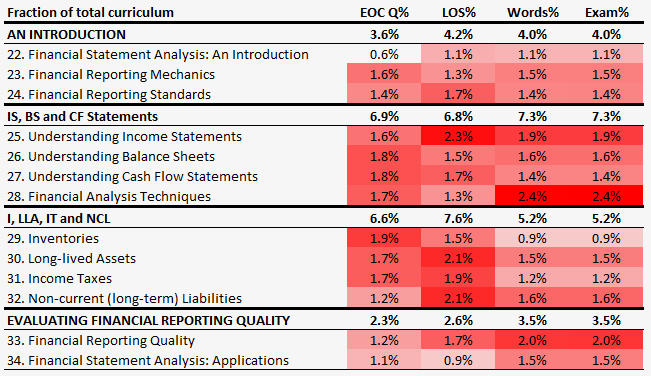What is it all about?
Financial Reporting and Analysis (FRA) is a daunting topic area in the curriculum by pretty much any measure, and unless you are an accountant you will probably find this topic fairly demanding. The 4 study sessions are divided into 13 readings spread over more than 600 pages. This is the equivalent of roughly 20% of the curriculum, and the guideline exam weight is likewise around 20%.
The Readings
Study session 7 makes up the first 150 pages and serve as an introduction to financial statements, the mechanics of how they work and the standards they are subject to. Study session 8 (250 pages) provides an introduction to income statements, balance sheets and cash flow statements and some basic techniques for analyzing these. Study session 9 (185 pages) delves into some of the complications surrounding inventories, long-lived assets, income taxes and non-current liabilities. Unless you keep focused the added complexity in these readings may leave you feeling slightly lost. Finally study session 10 (80 pages) rounds off the topic with some examples on how to assess financial reporting quality, and finally a bit more about financial statement analysis.
Where to focus your attention?
Some of the readings in study session 9 have got a slightly higher concentration of LOS and end of chapter questions comparing to the rest. Particularly the readings about long-lived assets and income taxes. As always there is no guarantee that these areas of the curriculum will be tested harder than the rest, but I would pay extra attention.
FRA Strategy
There are 112 LOS and 249 end of chapter questions in the FRA book. Like with all other topics practicing questions is key to your success on exam day. Your goal should be to be able to answer all of the LOS and end of chapter questions. I would suggest that you sit down, before even starting each reading, and attempt to answer all of the end of chapter questions. Once you are done, mark your score (You can stick your result in the comments below for other to see and compare) and pay attention to the areas in which you struggled the most. Also keep a record of all the questions that you answered incorrectly. Now when you start reading, you will know in which areas you are strong/weak, and you will be able to prioritize your reading intensity accordingly. E.g. if you were really struggling in answering the questions about inventories, read this segment twice slowly and do the end of chapter questions for this reading again.
Now once you are done with a reading, do another run through of the end of chapter questions, but this time answer only the questions that you got wrong or found difficult in the first attempt. E.g. if you aced 30% in your first attempt, you should focus on the remaining 70% of the end of chapter questions (this is why I asked you to keep a record of the questions that you answered incorrectly). Revise your answers in detail rinse and repeat until you can answer every single end of chapter question confidently.
If you go through this entire process you will be about as well prepared as you can be for this tricky part of the exam. Remember FRA makes up 20% of your exam score, so a good result will really help boost your chances of passing level 1.
If you would like an explanation about how the guideline exam weights per reading are calculated it is described under the Ethics topic area.
Please reach out at info@financialexamacademy.com if you are feeling stuck in FRA and/or if you have got a specific questions about anything else related to your studies.
Next up is Corporate Finance


